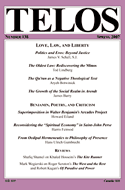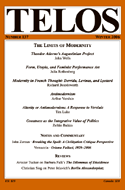 The November elections and the new Democratic majorities in the House and the Senate have been widely interpreted—or misinterpreted—as rejections of the Bush administration’s foreign policy, which itself has been widely labeled—or mislabeled—as the “neo-con” agenda. In fact the election outcomes were both more complex, as evidenced by the Lieberman victory in Connecticut over Lamont’s anti-war candidacy, and more sordid: when all is said and done, the elections probably turned on the congressional page sex scandal rather than on any debate over military strategy in the streets of Baghdad. The adage that one should be careful with one’s wishes applies in no small ways to the Democrats: it was comfortable for them to be able to attack Iraq policy, while basking in the opposition party’s luxury of not having to come up with any programmatic alternative. Too few troops? Too many troops? It made little difference as long as one did not have to make the decisions. How sweet it was. Now, after the November results, the new majority party ought to come up with something better on its own. So where’s the beef?
The November elections and the new Democratic majorities in the House and the Senate have been widely interpreted—or misinterpreted—as rejections of the Bush administration’s foreign policy, which itself has been widely labeled—or mislabeled—as the “neo-con” agenda. In fact the election outcomes were both more complex, as evidenced by the Lieberman victory in Connecticut over Lamont’s anti-war candidacy, and more sordid: when all is said and done, the elections probably turned on the congressional page sex scandal rather than on any debate over military strategy in the streets of Baghdad. The adage that one should be careful with one’s wishes applies in no small ways to the Democrats: it was comfortable for them to be able to attack Iraq policy, while basking in the opposition party’s luxury of not having to come up with any programmatic alternative. Too few troops? Too many troops? It made little difference as long as one did not have to make the decisions. How sweet it was. Now, after the November results, the new majority party ought to come up with something better on its own. So where’s the beef?
|
As noted previously here, the two points in the title need to be thought together: Baker’s ISG call to “talk” with Iran and the Iranian students’ protests against domestic repression in the Islamic Republic. Critics of the ISG report regularly face the smarmy response: well, golly gee, what’s wrong with talking? As a problem of theory, one could answer: plenty. Is talk a substitute for action? All talk and no action? Is talk a façade of comity designed to mask clandestine sins? Del dicho al hecho hay un gran trecho. Still, the advocates of talk can typically claim the moral high ground in a culture in which talk, discourse, and discussion are the ultimate values. This valorization of discussion is pure enlightenment: Kant’s public use of reason. Yet the value of talk only holds if all the interlocutors participate in the public on equal terms. The moral standing of talk presumes that all arguments can be heard: otherwise the talk is conspiracy or “secret diplomacy.” The objection to the ISG’s call for talks is not a rejection of speech as such: it is an indication of the suspicion figures like Baker and Perry arouse. We suspect that they will use the moral (Kantian) resonance of talk in order to pursue immoral (Machiavellian) ends. The Iraq Study Group has, notoriously, called for “talks” with Iran, as if there were reasonable interlocutors in Ahmadinejad’s gang. The octogenarian sages of that bipartisan committee evidently know something that Iranian students don’t—or is it perhaps the other way around. While Baker, blinded by the rose-colored glasses of realism (“let’s make a deal” is the core of his philosophy), hopes to practice his conversational Farsi, people who really have to live in the Islamic Republic know better and, as reported widely, students in Tehran have courageously confronted the regime. Bloggers in the safety of the US may quibble over the terminological propriety of “Islamic fascism” (“how can they be fascist if they don’t speak German,” they ask cleverly). But when Mahmoud the Magnificent visited Tehran’s Amir Kabir University last week, he reportedly faced some clear language: “Fascist president, the polytechnic is not for you.” According to the Mail and Guardian, Ahmadinejad faced chants of “Death to the dictator” as he addressed a gathering in the university’s sports hall last week. Several hundred students forced their way in to voice anger over a clampdown on universities since he became president last year. That’s a key point to remember: yes, a clampdown on the universities in Iran—even as former President Khatami was being feted in western universities, from Harvard to Saint Andrews. Do western academics care about repression of scholars and students anywhere? (Answer: yes, they care about Ward Churchill, but that’s about it.) Much criticism was directed at the circulation of the term “Islamic fascism” when it was used in the White House. Yet it has also been used within the Middle East as a term with which to characterize Hezbollah’s strategy of toppling the democratically elected Siniora government, through a combination of threats and violence and—planned for December 1—mass demonstrations. On July 17, on his Arab reform website, editor Pierre Akel analyzed Hezbollah strategy, and on October 16 he returned to his own previous text because of the pending showdown in Beirut. The analysis from the summer inquired into Hezbollah’s intention in kidnapping the Israeli soldiers, which set off the war. Akel argued that Hezbollah’s point was really to seize power in Beirut through provoking the war with Israel. The assassinations of Pierre Gemayel, the Lebanese Minister of Industry, and Alexander Litvinenko, the former Lieutenant Colonel in the Russian secret police who had found refuge in the West, nearly coincided. Gemayel was gunned down in Beirut on November 21, and Litvinenko succumbed to poisoning by the rare radioactive material polonium on November 23 in a London hospital. Syria and its agents are the primary suspects for the former: killing Gemayel was an obvious attempt to block the investigation into the earlier assassination of Rafik al-Hariri, while also bringing Lebanon one step further toward a recolonization in which Hezbollah would play the role previously reserved for the Syrian army. Meanwhile, there is hardly any doubt that the Kremlin ordered the Litvinenko murder: Litvinenko had become an outspoken critic of the Putin regime. In particular he had accused the Russian government of carrying out the apartment house bombings in Moscow in 1999, which served as a pretext for the war in Chechnya. What links the two events? We know that Russia had been dragging its feet in the United Nations on the Hariri tribunal and would have preferred to stop it there. In fact, that process is by no means over, and there will still be plenty of opportunity for Kremlin mischief to protect the culprits in Damascus who ordered the killings in Beirut—unless of course Hezbollah finishes that job first and stops the investigation on its own. Or the investigation may end up as a bargaining chip in the prospects for the “realists,” who still have some wind in their sails from the US elections. This scenario depends on the dubious hypothesis that by “talking” with Syria and giving Assad something—a pass on Hariri—Syria will somehow play a role in “solving” Iraq. |
||||
|
Telos Press Publishing · PO Box 811 · Candor, NY 13743 · Phone: 212-228-6479 Privacy Policy · Data Protection Copyright © 2025 Telos Press Publishing · All Rights Reserved |
||||
 The promises of modernity have always been problematic. The aspiration to draw a neat line between a rosy present and a benighted past, the paradigmatic modern historiography, never adequately gauged the force of tradition. The cultural legacy of the past can be heavy with inertia, but it can also draw on an organic vibrancy that can intrude abruptly into the up-to-date illusions of reason. What modern thought derides as old-fashioned just refuses to disappear—not because modernity has been too weak to expunge it (for it has surely tried hard to do so), but because modernity elicits its opposite, calls it forth, creates its own monsters, and then wonders why they won’t go away.
The promises of modernity have always been problematic. The aspiration to draw a neat line between a rosy present and a benighted past, the paradigmatic modern historiography, never adequately gauged the force of tradition. The cultural legacy of the past can be heavy with inertia, but it can also draw on an organic vibrancy that can intrude abruptly into the up-to-date illusions of reason. What modern thought derides as old-fashioned just refuses to disappear—not because modernity has been too weak to expunge it (for it has surely tried hard to do so), but because modernity elicits its opposite, calls it forth, creates its own monsters, and then wonders why they won’t go away. 

